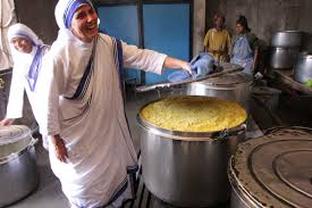 An MC sister cooking a meal for one of her priests.
An MC sister cooking a meal for one of her priests. The sisters feed their priests with the same love with which they clean their chapels. Three times a day a sister serves the priest his meals in the “priest room,” which is also the confessional and sometimes his bedroom. Sr. Amanda from India is serving me this retreat, with assistance from Sr. Therese Anna from Brazil. “Thank you, Father,” she beams after placing steaming plates of stew or soup on the table.
“But, I wish to thank you,” I smile.
“Oh, you may certainly thank me, but my greatest happiness is to see the fathers eat,” Sr. Amanda reassures me. “You hardly ate any of the chicken this afternoon,” she scolds. “Have some another sandwich.” The MC’s are ascetical in many ways, but not so much when it comes to food. “Sisters,” Mother Teresa would tell them, “you must eat enough to keep up your strength.” Sometimes, perhaps, a sister might go a bit farther than Mother would have recommended. All of them certainly make sure their priests have plenty to eat.
“Obrigado,” calls out Sister Amanda again, all smiles. She had placed a bowl of fried potatoes and another of steamed rice, two ham-and-cheese sandwiches, a pot of beef stew, a large salad, half a pound of sliced watermelon, a bag of potato chips, and various fruit drinks before me.
I used to get a little irritated at how much the MC’s expected me to eat, but I have long ago surrendered. They are mothers, and after all, our religion is based on food. Jesus commanded us to “do this in remembrance of me,” and he was talking about supper. From Mass to Mass, we eat our way to heaven. True, what we eat and drink is the Body and Blood of the Lord, and St. Paul excoriates the Corinthians for turning the Eucharist into a food fest, but for Jews and Christians, eating is sacred. Every meal recalls that Last Meal of the Lord before the Redemption. Upon appearing after his Resurrection, what did Jesus do? He wasted no time in having another meal with his disciples—this time a breakfast of bread and fish by the lakeshore.
“Obrigado” in Portuguese means the same thing as “eucharistein” in Greek: to render thanks. The Eucharist is how we render thanks, and we do it by feeding others and ourselves. My job as a priest can be reduced to one word: “feed,” as in “feed my sheep,” as Jesus instructed Peter. “Give them something to eat,” he had told the Apostles after the Sermon on the Mount. “If you love me, you will feed my people.” Why should I be surprised that Sr. Amanda takes any less delight in feeding her priests than her priests take in feeding her? I am saddened when folks do not come to Mass very often to eat the body and blood of Christ. Sr. Amanda is saddened by priests who don’t eat much of her food. God gives us food, and He gives us the Eucharist, so we can give it to others.
Tonight Sr. Amanda placed impossibly large quantities of food before me. She probably did that because I finished every last crumb of last night’s meal. I did my best tonight, and I think she was happy. My plan, after this retreat and next week’s retreat in Kenya, is to climb Mt. Kilimanjaro. I wonder if, for an additional fee, they will take you up the mountain in a sedan chair?


 RSS Feed
RSS Feed